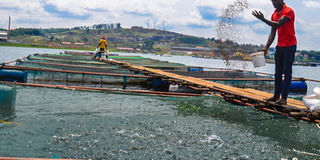Fish farmers accused of polluting L. Victoria

Accused. A fish farmer feeds his fish at Masese Cage Fish Farmers Cooperative Society on Lake Victoria in Jinja District on Monday. PHOTO BY DENIS EDEMA.
What you need to know:
Concerned. Fisheries officials say they will first investigate the issue before pronouncing themselves on the matter.
Fishermen at Masese Landing Site on Lake Victoria have accused their counterparts engaged in cage fish farming of polluting the water body and now want the authorities to prevail on them.
Cage fish farming is a type of rearing aquatic animals by confining them in large specific enclosures using nylon nets, sometimes rigged by metallic or plastic pipes.
Mr Joseph Ojambo, 34, a fisherman from Ntongolo Landing Site in Nyenga Division, Buikwe District, on Monday said cage fish farmers are polluting the lake by disposing of their dead fish in the lake, something he attributed to the type of food they are fed on.
“Some of the fish farmers in Masese are complaining of their fish dying. This could be as a result of the chemicals used for mixing the fish feeds that needs to be investigated,” Mr Ojambo said.
However, Mr Andrew Kisitu, another fisherman from Namugongo Landing Site in Mayuge District, said pollution of water bodies allegedly by the cage fish farmers could be true in small water bodies, but not big water bodies like Lake Victoria.
“One of the biggest pollutants of the water bodies in Jinja is the numerous factories situated next to the lake shores. These directly discharge wastes and impurities into the water using underground pipes,” he said.
Mr Emmanuel Bwire, another fisherman from Masese, however, said the current technological advancement cannot allow any harmful activity on water that affects aquatic lives.
“The feeds used by the cage fish farmers have been certified by Uganda National Bureau of Standards and other affiliate departments,” Mr Bwire said.
Dr Anthony Taabu-Munyaho, the director of research at National Fisheries Resources Research Institute (NaFIRRI), in an interview, said he did not want to speculate as a scientist that cage farming is polluting the lake until the matter is investigated.
He, however, said at one time they received complaints from National Water and Sewerage Cooperation that the presence of cages had increased the cost of treating water before supply.
Accordingly, a team of fish pathologists and NaFIRRI officials was dispatched that established that the fish farmers were using wrong fish feeding procedures.
“We established that cage fishermen were using sinking feeds, locally made on site, and were not ‘feeding by response’ to ensure that you stop adding food once fish show that they have stopped consuming,” he explained.
Dr Edward Rukuunya, the acting director of fisheries resources at the Ministry of Agriculture, Animal Industry and Fisheries, said cage fish farming poses a risk of disease and genetic distortion if not well managed.
“Cage fish farming, if not well managed, can change physical, chemical and biological conditions of the aquatic environment that can lead to increases in turbidity (measure of the degree to which the water loses its transparency due to the presence of suspended particulates),” he said.


